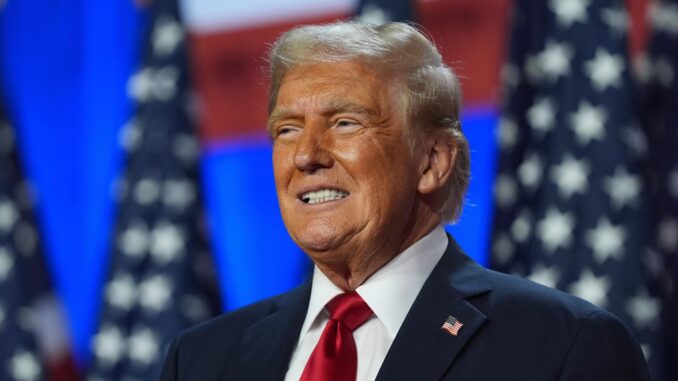
MANAMA, Bahrain — At glittering ballrooms in the Mideast this weekend, discussions of the wars and chaos gripping the region gave way to one central question: What’s going to happen when U.S. President-elect Donald Trump takes office next month?
Summits in both Bahrain and Qatar, neighboring Persian Gulf autocracies with a long history of a brothers’ rivalry, saw Trump discussed in open sessions, hushed chatter and pull-aside meetings among politicians, diplomats and uniformed military officers.
The reasons for the conversations are many. Chief among them is the Israel-Hamas war in the Gaza Strip, with over 44,000 Palestinians killed, and the tenuous ceasefire holding in Lebanon. Israel’s conduct in the wars, sparked by Hamas’ Oct. 7, 2023, attack on Israel that killed 1,200 people and saw 250 others taken hostage, enraged the wider Arab world.
President Joe Biden’s tight embrace of Israel in the time since has alienated many. Saudi Prince Turki al-Faisal, a prominent royal who led the kingdom’s intelligence service for more than two decades and served as ambassador to the U.S. and Britain, referred directly to Trump’s own online messages about the wars.
“Friendly countries in the region are hoping that Mr. Trump pursues what he started before — to bring PEACE with capital letters to the Middle East,” the prince told the International Institute for Strategic Studies’ Manama Dialogue in Bahrain.
“The Gulf countries, including my country, Saudi Arabia, are willing to walk with you, Mr. President, to achieve this noble order. It is time for America under your presidency to change the course of this troubled region.”
Prince Turki underlined the standard Saudi call for a peace that requires a two-state solution for the decadeslong Israeli-Palestinian crisis to end, with a Palestinian capital in east Jerusalem and the Gaza Strip and the West Bank based on 1967 borders fully under Palestinian control. But Trump in 2020 in his first term unveiled a peace plan that sided heavily with Israeli Prime Minister Benjamin Netanyahu’s hard-line nationalist vision for the region and pushed aside many of the Palestinians’ core demands.
Biden’s administration, meanwhile, made no headway on the conflict prior to the Hamas attack. Barbara A. Leaf, the top Mideast official at the U.S. State Department, described the Hamas assault as having “plunged the region into renewed conflict” in brief remarks at a side event in Bahrain.
At the Doha Forum in Qatar, Norway’s Foreign Minister Espen Barth Eide referred to the Mideast before the Oct. 7 attack as “not a stable, lasting situation — it was like a minefield.” Despite that, Trump’s experience reaching diplomatic recognition deals for Israel with both Bahrain and the United Arab Emirates might make a larger Mideast peace deal possible, Barth Eide said.
“I think the message now from this region is that that is perfectly doable. There might actually be a major deal, but it has to happen with Palestine,” he said. “It’s not one conflict, but there is a root conflict that connects to all of them, which is the absence of a solution to the Palestinian question.”
That extends all the way to Yemen, where the Houthi rebels who have held the country’s capital for over a decade now have gained acclaim in the Arab world for their attacks on shipping in the Red Sea and Gulf of Aden over the wars. Trump listed the Houthis as a foreign terrorist group, something rescinded by the Biden administration over their assessment it halted needed aid from getting into Yemen.
“I think in Yemen the upcoming Trump administration is most likely implement heavy sanctions,” said analyst Mohammed al-Basha, a Yemen expert. “That may push the Houthis to retaliate. … The idea that (sanctions) alone will pressure the Houthis to commit to peace and cease fire in the Red Sea — I don’t think that will happen.”
Then there’s Iran’s nuclear program, which the head of the International Atomic Energy Agency warned Friday in Bahrain was poised to “quite dramatically” increase its stockpile of near weapons-grade uranium.
Yet Iranian officials and the public have been openly musing whether Trump might strike a deal with Iran — even as he was the one who unilaterally withdrew America from Tehran’s 2015 nuclear deal with world powers that saw it get sanctions relief in exchange for greatly limiting its program.
And finally, there’s the Gulf states themselves. Some attendees at the two summits discussed their flight plans for trying to attend both. That would have been impossible during the yearslong Qatar crisis, which saw Bahrain, Egypt, Saudi Arabia and the UAE cut ties and boycott Qatar from 2017 until January 2021.
The crisis began after Trump’s first foreign trip as president to Saudi Arabia.
___
EDITOR’S NOTE — Jon Gambrell, the news director for the Gulf and Iran for The Associated Press, has reported from each of the Gulf Cooperation Council countries, Iran and other locations across the Mideast and wider world since joining the AP in 2006. ___
The Associated Press receives support for nuclear security coverage from the Carnegie Corporation of New York and Outrider Foundation. The AP is solely responsible for all content.
___
Additional AP coverage of the nuclear landscape: https://apnews.com/projects/the-new-nuclear-landscape/


Be the first to comment